
44 minute read
Enjoy the afterglow. Even
Although mature beyond his years, Olly admits that having a good mental attitude is something he has had to learn. “Everyone has those moments and thoughts where even if it’s the slightest flare-up you think, ‘I don’t really want to be dealing with this again right now.’ It puts your mood down without you realising it.”
He says his mates have noticed when this dark cloud descends. “I have had my friends from school notice a personality change in me,” he adds. “But I’ve got much better at controlling that recently. I’ve learned that UC is something I am going to have, it’s something I’ve got and I just take each day as it comes. If I have a flare-up I feel better about it these days because it’s just a reminder that I need to keep on top of everything and stay in the position I am.”
Advertisement
As well as carefully monitoring what he eats, Olly is able to use his exercise regime as a way of destressing.
“When I first got into parkour I spent three years or so watching videos online and teaching myself how to do stuff in my garden and in the park in my village [in the Lincolnshire Wolds] … I thought I’d like to teach myself a back flip. So I went to the park, spent weeks trying to figure out how to do it, to get myself ready mentally,” he says. Eventually he succeeded and that was it, he was hooked. “I fell in love with everything to do with parkour.”
Now, partly thanks to passing his driving test, he’s not just leaping PARKOUR HELPED ME BE POSITIVE ABOUT MY COLITIS around his village but also travels to nearby Lincoln to meet others who have the parkour bug.
Despite injuring his ankle last year, he’s back on his feet and can do back, front, side and wall flips. “I taught myself to do a cork before I did my ankle in, which was quite good fun. It’s kind of like a back flip but you go off of one leg and then sort of go horizontal in the air and then do a 360 spin in the air, while doing a flip.”
For Olly, the appeal is the challenge. “There’s nothing better than
being able to do something,”
he says. “It’s not just getting from one place to another, it’s not just getting over physical obstacles, it’s getting over mental ones because a lot of the time it’s your head that stops what your body can do. Which I sort of proved to myself when I found parkour, when I did the back flip. It looks bonkers and you don’t think you’ll ever be able to do it and the one thing that’s stopping you is your head.” He attributes parkour to helping him cope with his condition. “I genuinely think parkour is the main thing that’s helped me be in such a positive position about my Colitis. You can’t sit and mope all day – especially about my Colitis, which flares far more LIVING WITH IBD Looking for some great tips? See crohnsandcolitis. org.uk/ livingwithibd
Managing stress through parkour helps Olly to feel upbeat
with stress. If you sit down and stress all day you are just going to make yourself stressed and what do you expect other than more symptoms? So you go out, enjoy yourself, prove to yourself you can be normal and enjoy life, and do what you can.”
Olly says he feels blessed to have such a strong support network. His family – mother Sarah, father Michael and sister Caitlin – have been “unbelievably great”. Although he could have moved to a hospital closer to home, his parents are still happy to accompany him to see specialists at Queen’s Medical Centre in Nottingham – and they help him keep his feet firmly on the ground.
His friends reacted with typical teenage jocularity at first, joking about “the Robocop instrument” that did his endoscopy. “But I think the more I live with it,” says Olly, “they have got used to it and realised what it sort of means to me. So they have become a lot more supportive in the sense that if I am feeling a bit low and I say, ‘It’s down to my Colitis,’ they’ll say, ‘Well, if you need anything, let me know.’”
He says he doesn’t shy away from
HOW TO TACKLE STRESS
Olly has been inspired by hearing how others living with IBD cope with their condition

explaining his illness to those who ask. “I explain what it is and that I’ve got it and there’s not much I can do other than deal with it. I try my best to show it is something you’re stuck with but in a way that doesn’t lead to people feeling sorry for me. I prefer feeling like I’m winning. Positivity is key.”
Once his A levels are out of the way, Olly aims to study psychology at Lincoln University, with the end goal of becoming a mental health counsellor. He says he chose this route after watching a close friend being diagnosed with depression. “He was always the mad, crazy kid, the source of laughter … the nicest guy I have ever met and probably ever will meet, and he just completely flipped. He became the polar opposite and it was weird adjusting. I have been trying my best to help him as much as I can because obviously people like me and his other friends – we can only ever do so much. But he’s improving, which is really nice to see. But that kind of inspired me to try to get out there and try to do my part for people with mental health issues.”
Olly says his own health journey has made him more self-aware too. “I’ve had times that I’ve thought it’s a possibility my condition could get worse. But I don’t want to spend my life worrying about something that could happen when it might not.”
A Crohn’s and Colitis UK member and supporter (he raised around £200 for the charity by running the Lincoln 10K last year), Olly says hearing about other people’s health journeys helps. “I’ve read about people where [their IBD] has progressed a lot more and they’ve had surgery, and there are a lot of stories of people coming out 10 times stronger. It’s beautiful to read. People are doing amazingly and they show so much courage.
“I think those stories need to be told – it lowers the worry level. If it does happen to me, which hopefully it won’t, then I know these people have managed it, and why can’t I?” We all have to deal with a certain amount of stress in our lives but exams, upcoming events and life changes can all make it worse.
Here are some tips for decreasing the amount of stress in your life:

l Learn to say no without feeling guilty l Build in some time to relax every day – deep breathing, a bath, yoga or simply listening to music can help l Find an exercise you enjoy and schedule it into your week l Talk to a friend, a family member or someone you trust l Write a journal or find likeminded people on well-established online forums to chat with l Take breaks such as days out, short holidays or even just an hour away from the demands of your day l Speak to your GP or health professional if you feel things are getting on top of you l Make sure you get enough sleep l Avoid too much caffeine in your diet
CREATIVE FLARES WORDS FIONA McKINLAY PHOTOGRAPHS VARIOUS

MURRAY MACLEOD Musician
Anthemic guitar pop trio The Xcerts have spent the majority of 2018 on tour, playing to some of their biggest crowds yet across the UK and Europe thanks to the success of their latest album Hold On To Your Heart. Frontman Murray Macleod has Crohn’s Disease and although he has well-managed symptoms most of the time, it can catch him off guard. “I spent about three years not taking medication because I felt fine and was able to live without it. And then in 2014, when we were making our third album, things got quite stressful and I had a terrible flare-up. I went back on the medication and have been on it ever since.”
As a touring musician he has found maintaining a diet that works for him, and staying on top of his medication, to be essential.
“It’s good that veganism is common now, so pretty much every city we go to has a great selection of vegan restaurants – so I can eat clean if I want to. But last year we were on tour in Europe and I forgot to take my medication. I thought I’d be fine but ended up having a terrible episode in Frankfurt. There were people smoking and the secondhand smoke was really punishing my Crohn’s. I had to get my flatmate in Brighton to send medication to Paris. When we got there it still hadn’t arrived. Then we left Paris and I got back to Brighton and didn’t have any medication because he’d sent it all.” When Murray was diagnosed at the age of 16 he was “terrified”.
“I just thought, OK I have a really serious illness. I’m going to die.” After he got out of hospital, Murray was watching music channel MTV2 when he came across some unexpected peace of mind.
“I was so weak I could barely pick up the remote control. A Glassjaw video came on – I’d never heard of them. A banner along the bottom of the screen had facts about the band, and it came up saying that Daryl Palumbo, the lead singer, just had to
Life–affirming moments: The Xcerts

cancel a tour because of Crohn’s Disease. I learned a lot about Crohn’s after that from reading interviews with Glassjaw. It made me realise my life isn’t going to stop.”
Murray had been a sporty teenager, but anaemia from his IBD made it difficult for him to play as much as he had before – and, he says, “I bruise like a peach”. Instead of football, music became a refuge. He’d head to the practice room with his friends to write and play songs, some of which formed the basis of The Xcerts’ debut LP.
“I sang a lot about Crohn’s on the first album, and the confusion of it all. Listen Don’t Panic – that song is all about me and being diagnosed with Crohn’s Disease. I was an excitable and frantic kid anyway, so I went straight into panic mode. My parents and doctors would say, ‘Listen, don’t panic.’ “Sixteen is a confusing age anyway, but when you throw an illness into the mix it made for a really heavy time.”
Now he rarely worries about his IBD – as long as he eats well and packs his medication. Managing his condition has become an act of defiance.
“Everything the band has achieved – all the life-affirming moments that have come with this new album – are like a big ‘f*** you’ to Crohn’s.”
LIZ RICHARDSON Theatre maker
Liz Richardson had just left acting school when she was diagnosed with Ulcerative Colitis.
“The start of my Colitis was quite dramatic,” she says. “I kept going into hospital and I’d be there for two weeks at a time.
“I thought I’d come out of acting school and be an actor, have an agent, and go to
auditions. I got an agent but I lost them because I kept being ill. I always felt I was battling a little with my image too, because I was on so many steroids and strong drugs that my hair
thinned, my face was very swollen and I had a lot of fluid weight around my lower back and tummy.”
She got some work, but fatigue and flare-ups proved a real strain on fulfilling her acting ambitions.
In 2011, Liz had surgery to remove her entire colon and rectum, and to create a j-pouch. She says it changed her life.
“Then I decided I needed to regain all that I’d lost … So I started writing about my experiences in stand-up comedy form.”
She put together a stand-up routine and did quite well with it, but Liz was keen to develop a more theatrical piece. So together with theatre maker Tara Robinson she started writing Gutted. Described as “a shameless tale of love, laughter and loos”, the production charts Liz’s experiences with UC. It enjoyed a sold-out run in Manchester and critical acclaim at the Edinburgh Fringe in 2017, and has toured UK hospitals.
“Reliving a lot of the memories allowed me to go: ‘Oh, that’s why that happened, and that’s why I felt like that at that point.’ I feel privileged to use my art to kind of counsel my way through it.”
Liz is working on a new idea – unrelated to IBD – with HOME Theatre in Manchester, where she is a supported artist. “UC has taken me down a path I never imagined, as a theatre maker rather than a jobbing actress,” she says. “I take power over my own career and I’m not worrying about an agent or letting people down if I have fatigue. I’m really happy with my life.” Gutted is touring England and Wales this autumn. See theconkergroup.co.uk/gutted Major bowel surgery was life changing
MY IBD HAS TAKEN ME DOWN A PATH I NEVER IMAGINED
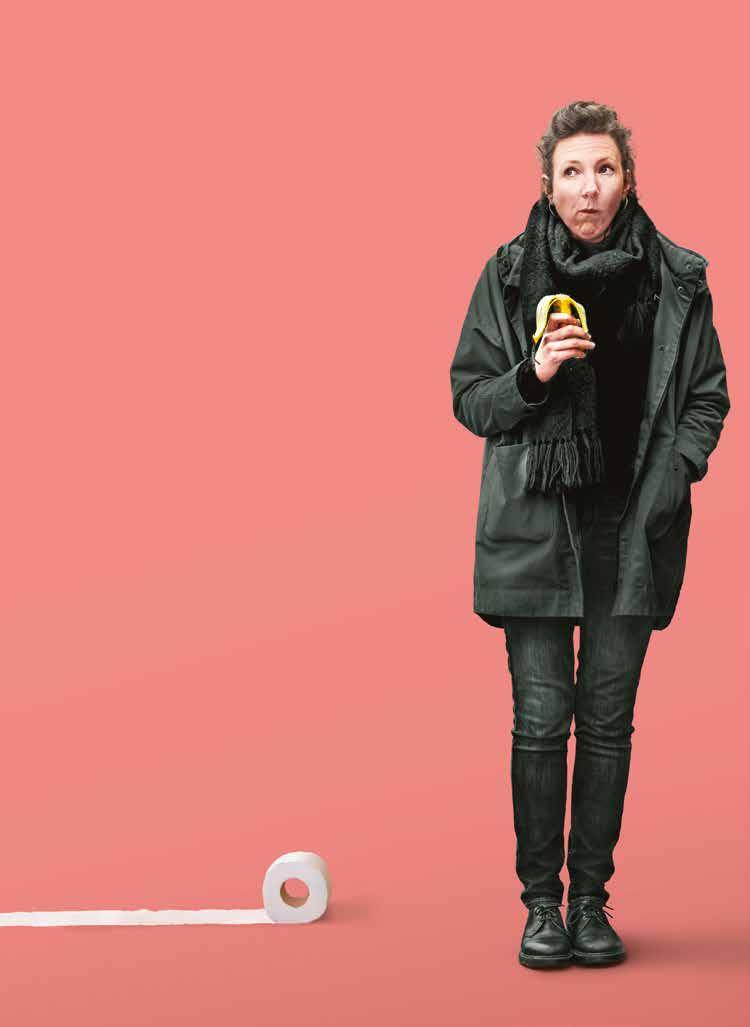

Writing about IBD is a privilege, says Liz
ROBERTO RICCIUTI / GETTY IMAGES

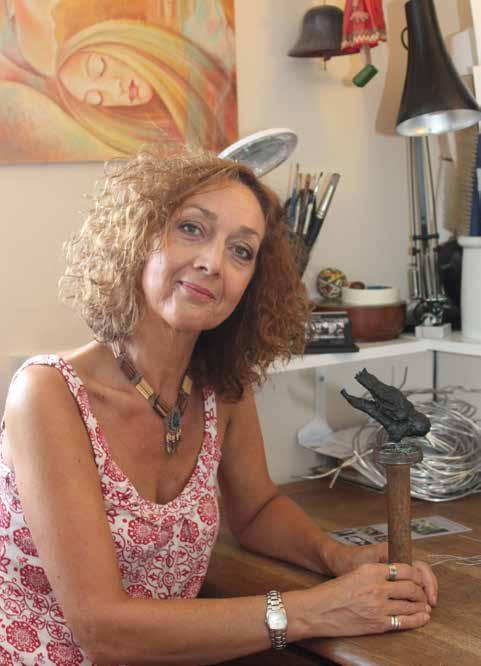
I SET UP A MIRROR ON MY DESK AND BEGAN DRAWING
HANNAH THOMAS Artist
Hannah in her studio at home
Hannah Thomas always loved to be creative, but when Crohn’s Disease affected her ability to work in a conventional environment it became an even more central part of her life. “I went through a five-year period of testing with no diagnosis,” she says. “Throughout those years I think a lot of damage was done. I lost a considerable amount of my bowel, which has affected my ability to absorb nutrients. I’ve struggled with active disease for years and have gone on to have several surgeries.” Working from home, Hannah
produced greeting cards and commissions, and studied psychology and art to inform her skills. Life drawing became her passion.
“Drawing from life forces you to really look, and look again, to see what’s there before your eyes,” she says.
Because of her Crohn’s, Hannah developed a tendency to work quickly: “I’m unable to spend a lot of time on any one thing because I’m always in and out of the toilet. Or I might start something and be inspired, only to find the next day I’m too unwell to work on it. My best work is done in a short period of time.” A couple of years ago Hannah felt so ill her world shrunk to just a few usable hours a day. The Crohn’s was unrelenting, alongside anaemia, and muscle and joint problems. “I yearned for a sense of fulfilment and purpose: a chance to give meaning to my days,” she says. “I set myself a project – to produce a ‘selfie’ a day for one year. With a limit of one hour, I kept the work to the size of a postcard. I set up a mirror and began drawing. I didn’t realise how challenging it would be so I began journaling on the back of the selfies, recording my physical and emotional journey through the illness.
“This really gave me a sense of achievement, freedom of expression within my isolation and a fantastic body of work, not only in images but also in thoughts and words.” Unbeknown to Hannah at the time, the project was a therapeutic tool that guided her through the illness into new treatment, which for now has opened up her life again.
KEEP THE FAITH
After being fitted for intravenous nutrition, Ramadan became a different challenge for Omar Malick
Sawm – it’s one of the Five Pillars of Islam. It means fasting from dawn to dusk during Ramadan, the ninth month in the Islamic calendar. Ramadan follows the lunar cycle, meaning that there’s a shift in when it falls each year. When it lands in summer, the fasting period in the UK can reach around 18 hours a day.
This year, Ramadan started on 16 May – and finishes on 14 June. For Muslims, observing Ramadan while living with IBD brings extra challenges.
For some, such as 33-year-old Omar Malick, fasting is not an option. Although Islam allows for someone to break the fast if they are severely ill and will become worse due to fasting, this can carry with it complicated feelings – guilt, worry that other people might judge you, an increased pressure to do more to mark Ramadan in other ways.
Omar was diagnosed with Crohn’s Disease when he was 16, and managed to fast a few times in the early years. His experience of IBD, though, has been severe. He’s had two resections and feeding tubes, and in 2012 had his first Hickman line inserted for intravenous nutrition.
He had been taking part in a medical trial which he politely says “didn’t go well”. His weight dropped to around 44kg – not a lot for a man of 6ft2in – and his symptoms became more severe. His consultant made the decision to take him off the trial and he spent five weeks in hospital, eventually leaving with the Hickman line. Alongside other adaptations to his lifestyle, fasting for Ramadan became incompatible with Omar’s health. “The past few years it’s been difficult,” Omar says. “Obviously you can’t take anything orally or WORDS FIONA McKINLAY PHOTOGRAPHS ALASTAIR LEVY

nutritionally or anything, and that extends to intravenously as well. At the moment, Ramadan’s in summer so it’s quite long and you’re looking at 17, 18 hours a day. The machine’s running 11 hours. It just won’t add up.
“I’ve had a health practitioner offer to write a letter to an imam or a religious leader to explain. Thankfully it’s never gone that far, but to know that I’ve got the medical staff on my side is always reassuring.
“The fasting is compulsory if you are able to. So if for medical reasons you can’t, if you’re taking medication, there is a degree of flexibility there. You can pay for the meals of someone who is fasting but can’t afford to feed themselves twice a day. The proper term for this is Fidyah. We’ve been doing this for a few years.”
It’s difficult, however, to fully accept the doctors’ advice.
“I’ve been a little bit naughty and have kept a few fasts, just on my nights off if I can manage. And it hasn’t been terrible, which sort of makes you feel worse – if I’ve managed it once, I can do it again. But it’s probably not a good idea,” he reflects.
The bigger challenge, Omar says, is the feeling of exclusion.
“Your friends, your family, they’re all taking part in this one-month
WHEN YOU SEE THE STITCHES AND SCARS, YOU REALISE IT’S NOT ALL GREAT
event and you’re sort of looking at it like an outsider. They’ll be talking about, oh, it’s been difficult this year, or how it’s going while there’s a heatwave on and how they’re all hungry and thirsty. You can’t relate to any of that, and they’re going through it, and you feel a little bit guilty for eating even though it’s completely out of your hands.”
Omar tries to be discreet when eating or drinking in public during Ramadan, as he realises it would be difficult for someone to understand on first sight why he is breaking fast.
“I’ve been lucky, no one’s really said anything to me,” he says, “but you get that feeling that you might be judged. People come to their own assumptions – he’s not fasting, he’s not doing this, he’s not doing that, he must be
Omar is fed intravenously by his Hickman line six nights a week
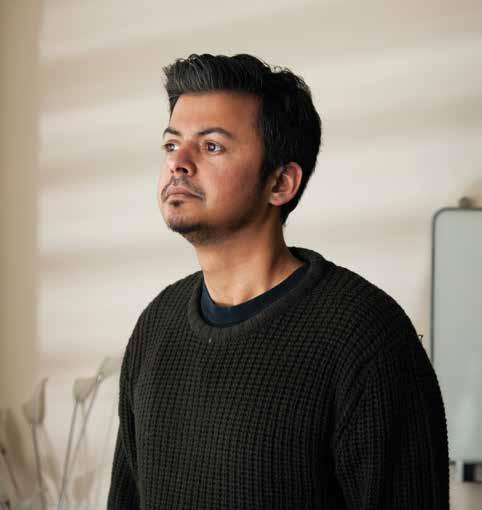
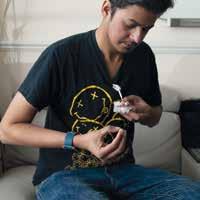
ashamed. People don’t automatically jump to the assumption that, oh, he must be unwell. “On first glance, I look pretty normal and it’s not until you see the scars, the stitches, the line dangling, that you realise it’s not all great. If someone ever does approach me, asking why are you eating or why are you doing this, I’m happy to explain why. I’m not ashamed or embarrassed by it.”
Omar is connected to his intravenous nutrition six nights a week. On his ‘day off’, he is encouraged
EXPERT ADVICE
Dr Barney Hawthorne offers some tips on fasting with IBD
Is it safe for me to fast? Yes, for the vast majority of patients with Crohn’s and Ulcerative Colitis. Some exceptions are: l if there are high fluid losses – either because you have an ileostomy that gives a high-volume output (more than 1.5 litres per 24 hours), or because of high losses from a fistula (a connection from the bowel to the abdominal wall) that has similar high output, or severe diarrhoea l if there is severe malnutrition, or inability to eat a large meal in a short time l if there is very active disease resulting in severe pain, fever, fatigue, vomiting or diarrhoea l if there is a need to take
medication by mouth during the day. With drugs taken once or twice a day it may be possible to take them before sunrise or
after sunset. If in doubt, consult your doctor.
Will fasting put my IBD into remission? There is no evidence that fasting improves inflammation in IBD. This ‘myth’ may have arisen as sometimes symptoms related to eating – for example, abdominal pain or diarrhoea – improve on stopping eating. The result is malnutrition, weight loss and the disease will still be there but the ability to recover will be impaired. There may be some indirect benefit from religious observance, and fellowship with other Muslims may have psychological benefits (the same applies for other faith groups), and this in turn has been shown to improve disease activity. Of course, if the fasting causes physical deterioration this outweighs these indirect benefits. to eat and drink – hydration is especially important to make sure he doesn’t undo good progress in his health. There are other ways to respect the sacred month, however, and Omar does what he can.
“Fasting is only one facet of Ramadan. Other ways to feel involved include praying, going to mosque, reading the Quran and generally taking the month to reflect and improve oneself. Aside from food you can refrain from other things, like gossiping, smoking, drinking etc. If you’re up for it, there are always charity projects you can help with – check with your local mosque to find out what’s happening.”
Some longer prayers at the mosque take place at night and, Omar says, attract a good turnout. By this time of day, though, Omar will be connected to his intravenous nutrition, and that makes this a potentially difficult situation for him.
“I avoid going out with my feed and pump – it’s in a rucksack, and to be around so many other people is a risk – it could get caught or, worst case, be mistaken for something else. Having to explain to a congregation why I can’t take off the rucksack with essentially wires coming out of it is not something I’d like to do.”
There is a tradition at the end of Ramadan that older relatives give money to the younger ones. For Omar, this is another awkward situation. He says: “You’re taking money from your grandparents, your parents, and thinking, well, I don’t really deserve this. I haven’t done anything this month to warrant this reward. They’ll say, ‘You still took part, you did this, you went to the mosque …’ but you don’t feel you deserve it.”
At the end of Ramadan, Eid is celebrated – and some of the weight will be lifted from Omar’s shoulders as sawm comes to an end. Living
YOU GET THAT FEELING THAT YOU MIGHT BE JUDGED
OMAR’S TIPS FOR FASTING WITH IBD
1
KNOW YOUR BODY No one knows your body better than yourself. If you truly feel like you can fast – maybe your IBD isn’t severe or you’re in remission – then try, but don’t feel bad or guilty if it’s not happening.
2
EAT WELL AT NIGHT It’s a challenge to ensure that when you do get to open the fast it adequately provides the nutrients you’ve missed out on during the day. Those of with us with IBD often don’t have the same reserves as other people, so we can very quickly go from just managing to really struggling.
3
BUT GO EASY ON THE SAMOSAS And, importantly, we’re all guilty of overindulging when it comes to breaking the fast. Sweets and fried food can often be a huge temptation, but because of the IBD we need to be careful. Go easy on the sugars and the samosas, or you will struggle later in the evening or the next day.
4
DON’T LET IT BREAK YOU If you have to break a fast for health reasons, don’t be disheartened. I’ve been told that if you break for reasons outside your control it still counts because the intent was there.
5
FIND OTHER WAYS TO BE INVOLVED Praying, going to mosque, reading the Quran, taking the month to reflect and improve oneself, and doing charitable work are all other ways to feel involved in Ramadan if you are unable to fast.

Fried food such as samosas can be a ‘huge temptation’
with IBD and a Hickman line will carry on year round and that alone isn’t an easy journey.
“It’s taken away spontaneous behaviour – if I want to go on holiday, I have to let the healthcare providers know six weeks in advance so they can prescribe me medication to take with me, and I’ve got all the letters, have to let the airline know, let the insurance company know. It’s a lot of organisation. There’s a risk of infection too. It’s been a big adaptation.
“At the moment, though, my weight is healthy – and it’s pretty much all down to the feed. If I’m not feeling like food, or I’m having a bad flare, I don’t have to stress as much because I know I’ll be getting between 1,600 and 2,400 calories overnight. “The Crohn’s itself is still active, and all the typical side effects from the trips to the loo to the flaring still happen on an almost daily basis. But saying that, I’ve recently started on a new course of ustekinumab. It’s early days, but fingers crossed it can help relieve some of the symptoms.”
YOUR VOICE
OUR MEMBERS GIVE THE VIEW FROM THE FRONT LINE
WHERE THERE IS A WILL …
It was as a volunteer that Gillian, 70, attended the London WALK IT in 2016. That was when she decided to put Crohn’s and Colitis UK in her will.
Some “young lads” were brought up on stage at the event to be interviewed about why they’d chosen to take part. “They were probably only about eight or nine – and this chap had brought along all his friends to do the walk.
“It made me think also how amazing these children are because I know a lot of younger children are getting diagnosed now. To cope is difficult enough as an adult – what on earth it must be like coping as a child or a young person? I can’t imagine.” Gillian thought of all the young people raising money through WALK IT and other activities, and those affected by IBD now and in the future. “There was a young lady in her 20s who had done a sponsored cross-channel swim and I just thought if someone is prepared to do all that … And I also thought about the youngsters for whom it’s so important to find a cure or better treatment.
“I felt, ‘At least I can leave some money in my will to help the research that’s ongoing.’ I’ve always been amazed at what a lot of money Crohn’s and Colitis UK gives to research projects, and that is the only way a cure or treatments are going to be found.”
“I don’t have a great deal of money, but I think it’s important. If everyone gave a little, that’s what builds up.” Gillian’s legacy gift to the charity will also be something of a thank you for support she has received.
She was diagnosed with Crohn’s Disease aged 50, having experienced symptoms for around 20 years prior to that without the right Gillian decided to leave a legacy for Crohn’s and Colitis UK after attending WALK IT
conclusion being reached. At one point, doctors thought she had ME (myalgic encephalomyelitis) due to the fatigue she was experiencing. A leaflet she picked up at the doctor’s surgery, though, flagged up the possibility of IBD being the cause. The leaflet also led her to the charity’s Local Network.
“Crohn’s and Colitis UK also helped me when I was applying for Disability Living Allowance. They produce an informative guide about applying and have an amazing helpline – which I’ve used more recently to find out about things. The support is so important. They say knowledge is power and once you understand a bit more about the illness it helps you cope with it.”
Gillian’s Crohn’s has been in remission for 10 years and she is currently not taking any medication. She does, however, suffer from joint inflammation, which can be a common symptom, even in periods of remission.
By leaving a gift in her will, Gillian will help support research and the continuation of services such as the Crohn’s and Colitis UK information line. “It’s not just about the good feeling,” she says. “It’s about knowing your money is going to something worthwhile.”

FIND OUT MORE ABOUT LEGACY GIVING remember@crohnsandcolitis.org.uk or 01727 734485 Leaving a gift in your will can fund research into treatments for IBD

KIT TRIBUTE
Football team sponsored in memory of local man
New strips and training jackets bearing the Crohn’s and Colitis UK logo have been bought for a football team in Essex in tribute to local man Nick Coppin, who died of colon cancer 19 years ago, aged 34.
“Despite being diagnosed with Ulcerative Colitis when he was 19, Nick was a very active person who loved his sports,” explains his sister, Helen Newman. “After our annual quiz night last year – organised by his friends Andy and Stuart – it felt fitting to use the £350 raised to sponsor my son’s football team, the Reed Hall Sentinels under-18s.”
A £500 donation from the North Essex Crohn’s and Colitis UK Network – where Helen is a volunteer – also went towards the kit, which Helen says has helped spread awareness and understanding of IBD.
“After the first match in the new kit, the manager of the opposing team said it was lovely to see because his father had IBD,” adds Helen. “It’s great to see the kit inspiring others to ask questions about the work of Crohn’s and Colitis UK and IBD, which is something I’m sure my brother would have been proud of.”
Nick’s family and friends have raised more than £15,000 for the charity since his passing.
£12K RAISED IN RIKUL’S MEMORY
Donations honour doctor who lived with Crohn’s
A JustGiving page set up in memory of Rikul Patel by his wife Sonia has received more than 200 donations, totalling upwards of £12,000.
Rikul was diagnosed at the age of seven and spent much of his life in and out of hospital.
He qualified as a doctor at the age of 25, despite flare-ups and surgeries during his training. Rikul and Sonia got married in August 2015.
“I loved him in every way possible (including his stoma) and together we always found the silver lining in each adversity,” says Sonia.
“He was my pillar of strength and his life will be a constant reminder that we must carry on and live to fight another day.” Although it wasn’t Crohn’s Disease that took Rikul’s life, raising awareness and support for those living with IBD was a goal he strived for, and Sonia is continuing

this in his memory at justgiving.com/rikul-patel

WORTH THE WEIGHT
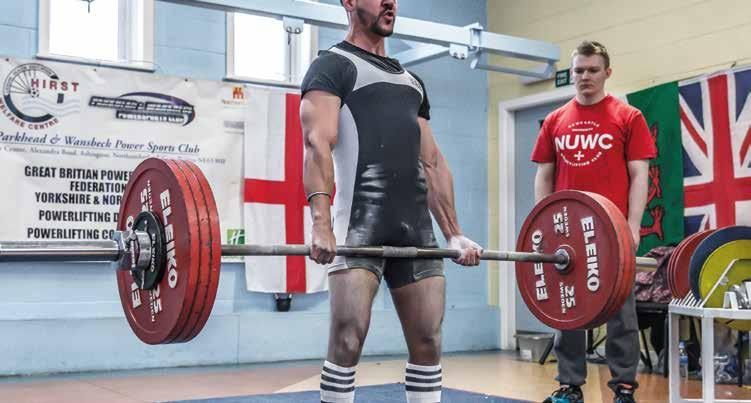
Manny Tura, 27, from Leeds, has broken a deadlift record in the Yorkshire northeast regional powerlifting competition, which qualified him to compete at a national level in September – an accolade he never could have imagined 18 months ago. Diagnosed with Crohn’s Disease in 2001, Manny had been adept at managing his IBD in his everyday life, but then his bowel perforated on Christmas Day in 2016.
“Everything went downhill – I had one foot of my inflamed intestine removed and was fitted with an ileostomy bag. After this I thought I’d be able to focus on getting well but was hospitalised again in February 2017 when my weight dropped to 5st 2lb,” explains Manny.
Manny was in hospital for six weeks and surgeons told him he would be unable to have ileostomy-reversal surgery until he put on at least three stone. That fuelled his fire to improve his condition. “I started reading about food, nutrients and how the stomach and gut work as I wanted to be fitter, healthier and stronger than I had been A lifestyle change helped Manny Tura power himself to new heights I’M ECSTATIC WITH HOW FAR I’VE PROGRESSED prior to being so ill,” says Manny. “I ate five to six meals a day while being fed intravenously and set daily goals of walking further from my hospital bed to build up my strength.”
However, after a major issue with his stoma in May 2017, surgeons decided reversing his ileostomy was Manny’s best option.
He says: “Once I had healed, I started going to the gym five days a week and cut out fried food, sweets
Manny in February 2017 and, above, in January this year
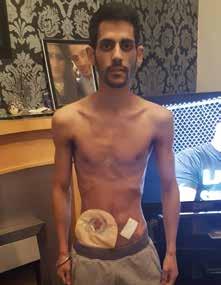
and fizzy drinks in favour of healthy foods such as fish, chicken and eggs. Eating healthily and maintaining an active lifestyle has really improved my IBD.” “Never let IBD define you; you define IBD,” he adds. “The support I’ve received has been overwhelming and I’m ecstatic with how far I’ve progressed seven months after surgery.” Read more about Manny’s experience of IBD at allmyfriendsareeggs.com
FOREVER FRIENDS How to support someone with IBD
Seeing how Crohn’s Disease affects her best friend Taryn’s life, 28-year-old Alexandra Hackwell persuaded her workplace to make Crohn’s and Colitis UK its 2018 charity of the year.
“Over the past year Taryn has been placed on a liquid diet and undergone many operations, including having part of her intestine removed, to help manage her condition,” says Alexandra, a procurement manager at Kent-based MHS Group.
“I nominated Crohn’s and Colitis UK to raise awareness of IBD and to show how it affects all aspects of your life, as well as your physical and mental health. People assume that it’s just an illness that affects your bowels but it’s so much more than this.” From a ‘dress as a director’ day (directors wear black trousers and a blue shirt) to a royal wedding-themed tea party, the colleagues have held a number of inventive activities, putting them well on their way to achieve their fundraising target of £25,000. “We’ve raised £2,000 so far and hope to raise more via WALK IT, an I’m a Celebrity-style competition and our Christmas party,” says Alexandra. “Everyone at work has been really supportive. A lot of people have told me that they have or know someone living with Crohn’s or Colitis, so our fundraising has opened up the conversation around IBD.”
For those thinking of making Crohn’s and Colitis UK their charity of the year, Alexandra says “just to go for it”.
“Crohn’s and Colitis UK has been really supportive throughout,” she adds. “It’s been a lot of fun to raise money for and awareness of IBD.” Contact partnerships@ crohnsandcolitis.org.uk to support Crohn’s and Colitis UK through your workplace. Alexandra Hackwell shares why she nominated Crohn’s and Colitis UK Alexandra and Taryn

SILENCE IS GOLDEN How keeping quiet at work helped Carole Roberts raise £1,300
“My week-long sponsored silence began as a bit of a joke,” laughs Carole Roberts. “I’m known to be a bit of a chatterbox – my colleagues didn’t think I could do it.” The Crohn’s and Colitis UK information officer carried out her sponsored silence at work in January, and found it to be a real eye-opener.
“I wasn’t prepared to feel so frustrated and isolated, but everyone got behind me,” says Carole. “My original aim was £300, so raising £1,296 has been incredible. I’d encourage everyone to put their fundraising ideas, no matter how silly they think they are, into action.” Emily Goldsmith, 20, has been a huge help to her friend Reece Collins since the 25-year-old was diagnosed with Crohn’s. These are her top tips for supporting a pal with IBD:
1KNOWLEDGE IS POWER Share what you’ve learned with your loved ones because, like you, each day they’re learning more about IBD.
2ASK QUESTIONS Learning from the experience of others is a great way to bolster your knowledge.
3GET INVOLVED I volunteer for the Leicestershire and Rutland Local Network. Getting involved with your local IBD community is a great way to learn more and make friends.
4TALK IT OUT This is really important when Reece has had a challenging day or just wants to have a laugh to take his mind off things.
5BE YOURSELF Be loving, honest and caring. Just being by your loved one’s side is a calming influence.
Emily (left) and Reece
READ ALL ABOUT IT TRY THESE NEW-EDITION PUBLICATIONS TO HELP MAKE LIFE WITH IBD EASIER
NEW: SUPPORTING SOMEONE WITH IBD: A GUIDE FOR FRIENDS AND FAMILY Finding out that someone you care about has Crohn’s Disease or Ulcerative Colitis is a shock. You might be feeling anxious about what comes next and how their life will be affected. This information sheet discusses the valuable things you can do to help someone living with these conditions, while making sure you’re looking after yourself.
NEW: GOLIMUMAB This new drug treatment sheet provides helpful information about the biologic anti-TNF drug golimumab CLAIMING PERSONAL INDEPENDENCE PAYMENTS (PIP) A guide to help people aged 16 to 64 with Crohn’s or Colitis apply for Personal Independence Payment (PIP). It explains who can qualify for PIP and how the application process works, as well as how to increase your chance of a successful claim.
CLAIMING DLA - CHILDREN UNDER 16 A guide to claiming Disability Living Allowance (DLA) if your child has Crohn’s or Colitis. The guide takes you step by step through the whole process of making a claim for DLA.
TALKING TO MY CHILD
Hannah Daragon celebrates her award AT THE TOP OF HER GAME

Former teacher Hannah Daragon has won an eBay inspiration award for her firm, Hannah’s Games, which she set up while recovering from a bowel resection. and the business, which sells 500-1,000 games per week.
She was delighted with her accolade at eBay’s National Business Awards 2017. “eBay has been a main player in my life with IBD, so I From bowel resection to award-winning company
JUST ASK
THE EXPERTS ANSWER YOUR QUESTIONS
DR CHRISTIAN SELINGER Clinical lead for gastroenterology at St James University Hospital, Leeds
PROFESSOR CHRIS PROBERT Professor of gastroenterology at the University of Liverpool
DOUBLE TROUBLE Q Is it possible to have both Crohn’s Disease and Ulcerative Colitis at the same time?
PROF PROBERT SAYS No. There are no recorded cases of people having both. There are patients in whom the diagnosis of Ulcerative Colitis appears to change to Crohn’s Colitis, which is Crohn’s Disease of the colon: such switches are not rare, but reflect the interpretation of clinical data and the difficulty that may arise when trying to distinguish between these two conditions.
It is worth remembering that Ulcerative Colitis does not involve the small intestine (except for rare cases of backwash ileitis), so once the small intestine is involved the diagnosis of Crohn’s should be easy to make. PROF PROBERT SAYS There is a general reluctance to accept donations from people with any disorder in case it might be passed on to the recipient – even when this seems very unlikely. More significantly, perhaps, is the risk of passing on medication with the blood: the recipient might have side effects from the medication that they are unaware of consuming.
A final consideration is anaemia. Anaemia is common in IBD, especially iron-deficiency anaemia, and giving blood will exacerbate this. DR SELINGER SAYS Some women with IBD can struggle to get pregnant. Becoming pregnant is much more likely when IBD is well controlled, both when trying to conceive naturally and when undergoing IVF. It is therefore a good idea to see your IBD team for a check-up prior to trying for a pregnancy. For pregnancy, a balance between the risk of an IBD flare that can have bad effects on the unborn baby and the risk of any drugs used in IBD needs to be struck. With the exception of methotrexate, SEEING RED Q Why are people with IBD not allowed to give blood? BABY STEPS Q Would IBD drugs have any effect on IVF? the benefits of IBD drugs usually outweigh the risks by far. Your IBD team can advise you on your individual circumstances. When undergoing IVF, it is important to stay well to increase the chance of it being successful. In theory, some of the IBD drugs (azathioprine, for example) can reduce the chance of IVF working, but more active IBD will have the same effect. It is therefore generally advisable to not change IBD medication for IVF. It is, however, a good idea to discuss this with your IBD team prior to starting IVF.
INSIDE STORY Q Could worm therapy help treat my IBD?
PROF PROBERT SAYS
for the treatment of Ulcerative Colitis. ABOUT MY IBD As a parent with Crohn’s or Hannah, who was diagnosed with Crohn’s entered the competition not expecting much – and I won,”
Colitis, you may be Disease in 2005, started the laughs Hannah.
NEW: USTEKINUMAB You can find helpful information about the biologic drug ustekinumab for the treatment of Crohn’s Disease in this new drug treatment sheet. concerned about whether to talk to your child about your illness, and what they should know. This information sheet looks at ways to talk to children of various ages about your condition.
32 • XXXXXX 20XX • CONNECT32 • XXXXXX 20XX • CONNECT TALKING TO MY CHILD ABOUT MY IBD INTRODUCTION As a parent with Ulcerative Colitis or Crohn’s Disease (collectively known as Inflammatory Bowel Disease or IBD), you may be concerned about whether to talk to your child about your illness. Some parents may wish to keep their illness to themselves, feeling that it is better for their children not to know about it, particularly if the condition is mild. Other parents may decide to tell their children about it, especially if they feel that their illness may be affecting the family. This information sheet looks at talking to your child about your IBD, and suggests ways in which you can go about this. SHOULD I TELL MY CHILD? What are the effects of not telling my child? If your IBD is not severe, or you are in remission, you may feel that it is not necessary to tell your child. You may also decide not to worry your children, particularly if they are young or sensitive. However, with some children, not telling them can cause problems. Some children are very sensitive to tension and stress. Even young children may sense that something is wrong, particularly if they overhear an adult conversation about your IBD, or perhaps see you take medication for it. If your child realises that you are unwell, the fact that you aren’t telling them anything may make them misinterpret the situation. What they are imagining may be far worse than the truth. The fact that you are not talking about it may suggest to them that it is a subject too terrible to talk about, and they may even believe that you will die from your IBD. Some older children might worry that you have Also, some children can feel deeply hurt if they are not told about what is happening. It can make them feel very anxious and left out, even unwanted. Children often think differently from adults. Many young children have simple
FOR MORE INFORMATION crohnsandcolitis.org.uk/ publications
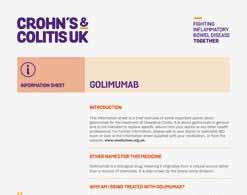
online business in 2010.
“The company was like a rehabilitation tool,” Hannah says. “I used to rock up to my friends’ hen parties with my games, so I had a go at selling them on eBay and it gave me a real sense of validation.” Hannah was thrilled to become a mother in 2016, despite fears that the surgeries she had undergone for Crohn’s Disease would make a pregnancy unlikely.
She then gave up teaching to concentrate on her family “I got £1,000 and an allexpenses-paid trip to eBay’s London HQ, where I gave a speech and met the company’s vice-president.” She adds: “Running a business means if I’m having a flare-up I can manage it around my life. I lead my life now and have the power to choose how I roll with the punches – Hannah’s Games taught me that.”
FOR MORE INFORMATION hannahsgames.co.uk

In short, not at this time. IBD occurs less commonly in regions where worm infections are common. As these nations become more westernised/ wealthier they have more cases of IBD – perhaps as a result of having fewer worms. However, a lot of other things change too – including diet. There have been several laboratory studies that suggest worm therapy ought to help treat IBD. However, a recent article combined the very best human-trial data and concluded that, at this time, there was no evidence to support the use of worms to treat IBD in humans.
IBD and anxiety had got in the way of activity and travel for Rachel Green, 47, until she had an ileostomy. Since then she’s been living every day to the fullest
Sixteen years of IBD takes its toll and a lot of hesitancy had crept into my life. I had become anxious about where the bathrooms were or what I’d do if I needed the toilet when out and started making life choices around those concerns.
I was scared to fly, worried about going out to dinner and eventually it was like I was living life on a postage stamp, especially when I came out of remission at Christmas 2015 and all of my drugs failed.

Choosing surgery was a big decision but absolutely the right one after a year of being very unwell and I had no doubts, despite a lot of fear about what life would be like. When I woke up at KIMS Hospital I felt better despite having just had major surgery.
Six months later I got a bike. That was the beginning of getting back into activity and getting out. I was so thrilled to be alive, to do what I wanted and go wherever I liked without a second thought.
The stoma nurses at Medway Hospital are wonderful – personable, human and kind. They introduced me to a physical recovery programme and I was also able to access counselling.
Rachel Green hits the slopes
Both gave me a structure to get back to life and fitness in an appropriate way. Life post-surgery can be very isolating so finding a community of like-minded people helped so much. I also found an online group of athletes with ostomies where we might talk more about sport than about our health, but we’re in the same position.

Most of the time I manage my ileostomy without any problems. The couple of incidents I have experienced have made me realise how well I’ve adapted. I’ve had a bag explode in a hotel bed and in situations like that you’re either floored
or deal with it, so I go for the second option. A problem managed is not a problem. Nine months after surgery I was made redundant from my job, which turned into a really positive experience. It was time to branch out and work for myself.
That sense of freedom and independence has reached every area of my life and made me feel the most alive I’ve felt in years – and that’s one of the reasons I went skiing a year after my surgery. I’d tried it before but felt I never really got the chance to find out how much I enjoyed it. I had the most amazing time.
I went to Italy and had to work out how to empty my bag in tiny mountainside cubicles and ensure I was well hydrated. The following month I went to Austria for a few days and fitted in a day’s skiing, and now I’m hoping to go to Canada to do glacier kayaking, which really sums up how surgery has changed my life for the better.
IBD wasn’t my fault but I am responsible for how I respond to it. That’s why I am grabbing life and all it has to offer with both hands.
LIVING WITH IBD See our videos at crohnsandcolitis.org.uk/ IBDliving
FIND AN IBD NURSE SPECIALIST Need help locating expert support and advice on your IBD?



Crohn’s and Colitis UK believes that access to IBD nurse specialists is vital for people living with IBD to get quick and effective care.
Find advice lines and services run by specialist IBD nurses in all areas of the UK by using the interactive map – and information on what to do in an emergency – on the Crohn’s and Colitis UK website.
ANNUAL GENERAL MEETING
VENUE 1st floor, Helios Court 1 Bishop Square Hatfield Business Park Hatfield AL10 9NE DATE Saturday 8 September



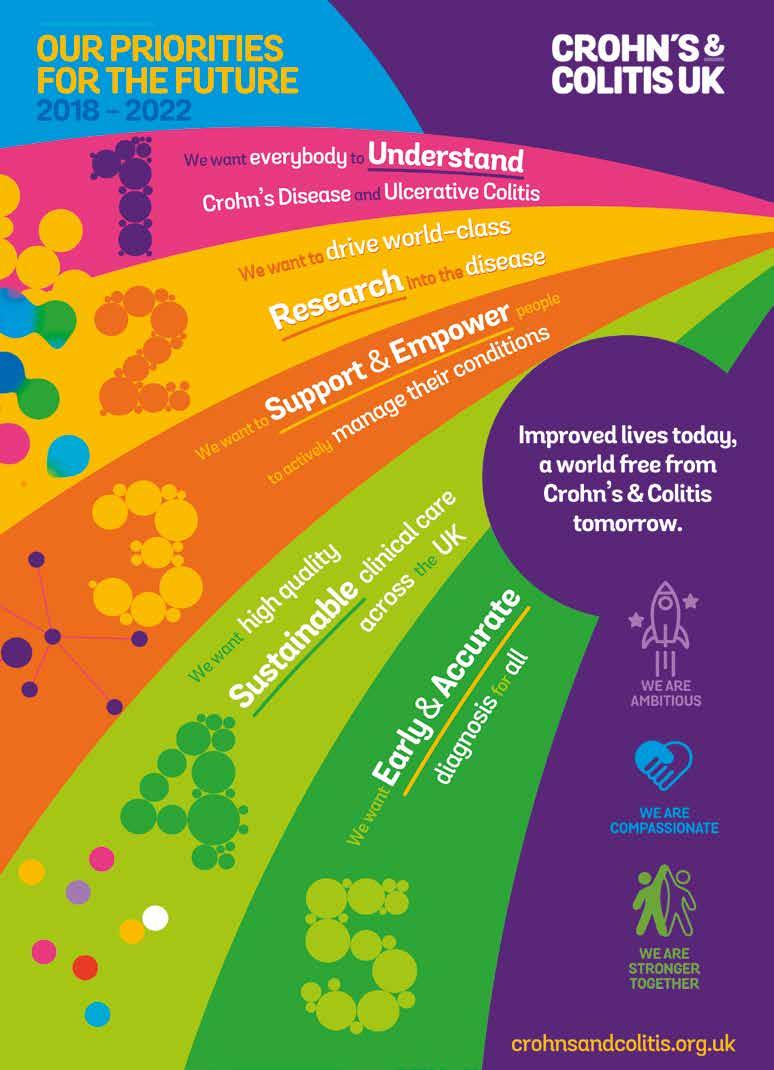
TIME 11.30am-1.30pm INCLUDES BUFFET LUNCH
Attend in person or participate online
• Discuss what it means to be a member of Crohn’s and Colitis UK • Influence the direction of your charity • Meet staff and trustees and learn about key projects we are working on • Chat with other members over an informal lunch • See our new offices
To register your interest in attending email meetings@crohnsandcolitis.org.uk with ‘AGM’ in the subject line. Please tell us your name, postcode and membership number if known.
A full AGM programme and formal notice of the meeting, including any or all resolutions, will be published at crohnsandcolitis.org.uk in July.
Registration is needed in order to vote online and details of how to do this will also be on the website. A proxy voting form will also be available online for those who are unable to attend.
If you would like to receive registration forms and AGM details in the post, please contact Carrie Lynch on 01727 734495 or in writing to Jane Roberts, Crohn’s and Colitis UK, AGM, 45 Grosvenor Road, St. Albans, Herts AL1 3AW. Email enquiries to: jane.roberts@ crohnsandcolitis.org.uk







